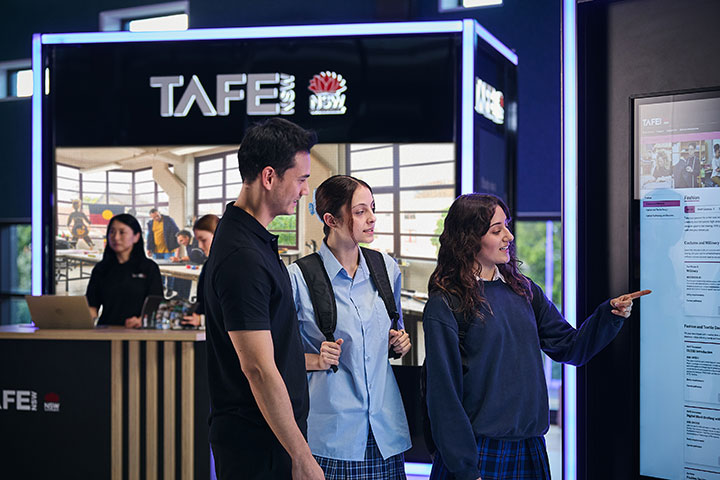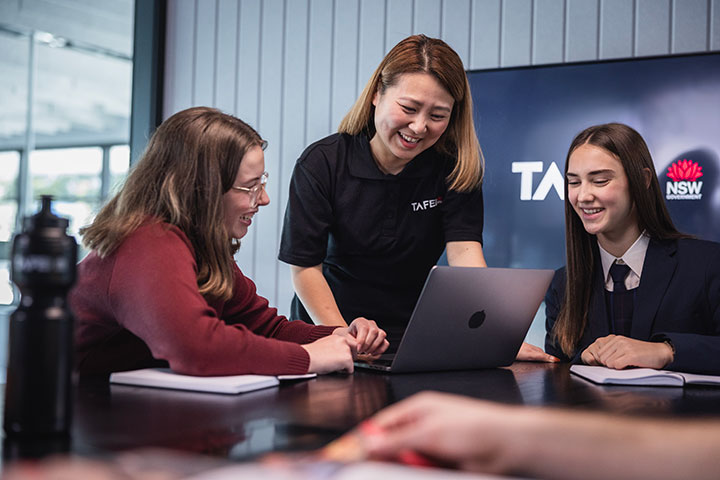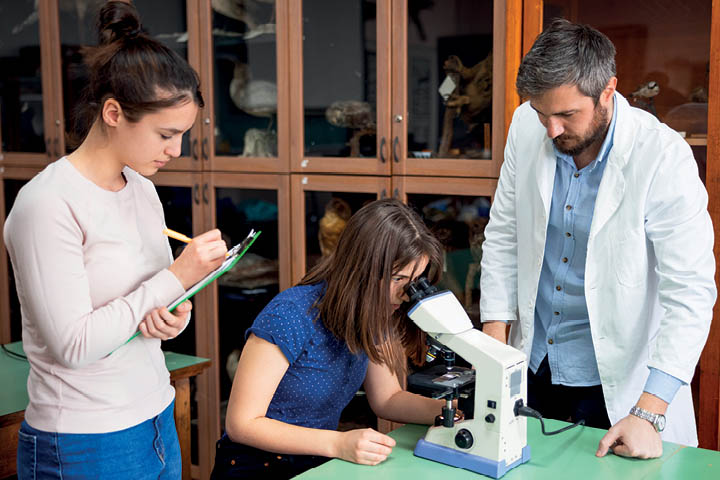TAFE NSW for schools
With our diverse range of courses, strong industry connections and approaches to learning that suit all needs, TAFE NSW will help students get the job they want. Our passionate teachers have current industry experience, meaning our students learn real-world skills that see them become in-demand and job ready, with many of our students graduating to become leaders, innovators and entrepreneurs who contribute to our global economy.
Careers Advisers
Help change lives with the right pathway. As a high school Careers Adviser, you play a pivotal role in offering career guidance and career choices for school students.
Explore student pathways below.

TAFE NSW delivery of school programs

TAFE-delivered Vocational Education and Training (TVET)
Get a head start on your career and complete a TVET course, while still at school.

School Based Apprenticeships and Traineeships (SBAT)
Combine paid work, training and school as you work towards a nationally recognised qualification as part of your HSC.

Bradfield College
Catering to students in Years 11 and 12, Bradfield Senior College specialises in personalised education in the creative industries.
Alternative to school programs

Tertiary Preparation Certificate (TPC)
The TPC is a qualification equivalent to Year 12, giving you a Tertiary Entrance Score and access to university without the HSC.

Higher School Certificate (HSC)
Prepare for a TAFE NSW degree, future study or the workforce as you study the HSC on your terms.

Year 10 Equivalent
You can apply to enrol in the equivalent of Year 10 (Certificate II) at TAFE NSW if you are attending a school, are home schooled or not currently at school.
School leaver programs

Apprenticeships & Traineeships
Apprentices and trainees are in high demand. Find out how you can become one.

University Pathways
Qualify for university and use your TAFE NSW training towards your degree with recognition of prior learning, so you can start at a more advanced stage.

Scholarships
Every year we award hundreds of scholarships to our students, so make this year your year to be rewarded.
Testimonials

Charles
Careers Adviser

Ranan
Certificate III in Health Services Assistant

Tracey
Parent
Frequently asked questions
The NSW Government requires young people to stay at school until they complete Year 10, or until they turn 17 years old - whichever comes first.
Registered home schooling or the completion of a Certificate II course at TAFE NSW are approved as alternative ways of meeting compulsory education requirements. Taking up an apprenticeship or traineeship is also an approved reason for leaving school.
TAFE NSW issues certificates to students who successfully complete courses.
Students need to be at least 15 years old to enrol at TAFE NSW.
There are some exceptions, such as apprentices and trainees, who can be 14 years and nine months, or students who gain their principal’s approval, as well as TAFE NSW approval, to participate in a TVET program under the age of 15.
If you are not yet 15 years old, you can speak with the Careers Adviser at your high school, or contact us on 131 601 and ask to be put through to your local TAFE NSW School Relationship Coordinator, to discuss your interests.
Notes for TAFE NSW staff: Students under 18 years of age are required to get written parental/guardian consent for enrolment to proceed. This means a completed enrolment form, with signatures from both the student and parent/guardian, is required.
A parent or guardian’s consent is needed for the use and disclosure of personal information under the Schedule 1, Smart and Skilled Operating Guidelines, as well as assent with the TAFE NSW Enrolment Terms and Conditions.
The Department of Education (DoE) defines exceptions where a person under 18 years of age, can be considered to be independent.
If you are 17 years old OR have evidence that you have completed year 10, you are eligible to study for any nationally recognised TAFE NSW Vocational Education and Training (VET) qualification, where you also meet the entry requirements.
You may be eligible for subsidised training at TAFE NSW under Smart and Skilled if you:
- are 17 or evidence of completion of year 10
- have left school
- and meet the Smart and Skilled eligibility criteria.
TAFE NSW offers hundreds of full time and part time courses. Many courses require little or no prior experience or access to the workplace. Many qualifications are fee-free (subsidised by the NSW Government) and involve work placements to get you on the pathway towards your future career. The course lists on the TAFE NSW website include the courses offered at TAFE NSW, as well as information on entry requirements, fees, and subsidies.
If you have turned 17 and have evidence of completing year 10, but are still at school, you may be able to enrol at TAFE NSW as part of your studies. Speak with your school’s Careers Adviser to discuss your options.
Alternatively, you can stay at school and enrol in a course outside of school hours, as long as you:
- meet the entry requirements
- and your school’s principal agrees that it will not interfere with your school work.
However, you will be required to pay the full fee for this course. No concessions or subsidies are available.
Please call 131 601 and ask to speak with your local TAFE NSW School Relationship Coordinator.
If you are 15 or 16 years old and do not have evidence of completion of year 10, you may still be able to enrol at TAFE NSW, and may be eligible for subsidised training.
Options for you include:
- speaking with your school Careers Adviser to find out about options to stay at school and enrol in a TAFE NSW program offered jointly with your high school (e.g. TVET, SBAT or YES program)
- leaving school to take up a formal apprenticeship or traineeship with TAFE NSW as your RTO
- seeking the approval of your school’s principal, to leave school and complete the Year 10 equivalent via a Certificate II qualification at TAFE NSW.
If you would like to stay at school and enrol in a qualification other than TVET or SBAT, you may be able to do so. Your principal will need to confirm that this will not interfere with your school studies. This will require full fee payment, and no concessions or subsidies are available.
Please call 131 601 and ask to speak to your local TAFE NSW school relationship coordinator.
It is essential that your Year 10 equivalent application form is approved by your school’s principal and by TAFE NSW, so that your Year 10 equivalent course can be approved for Smart and Skilled subsidised training.
If you are a NESA-registered home schooling student with a current Certificate of Home Schooling Registration, you can apply to enrol in any TAFE NSW course where you meet the foundation requirements.
Home schooled students with a current certificate from NESA, who also meet the Smart and Skilled eligibility criteria, are eligible for subsidised training at TAFE NSW, under Smart and Skilled.
You can enrol at TAFE NSW and may still be eligible for subsidised training, if your Certificate of Home Schooling Registration expired less than three months ago, and you have applied to have it renewed. You will need to provide your renewed Certificate when it is issued by NESA.
If you would like more information, please email the EducationandTrainingStrategy@tafensw.edu.au.
If you are 15 or 16 years old and do not have evidence of completion of year 10, you may still be able to enrol at TAFE NSW, and may be eligible for subsidised training.
Options for you include:
- speaking with your school Careers Adviser to find out about options to stay at school and enrol in a TAFE NSW program offered jointly with your high school (e.g. TVET, SBAT or YES program)
- leaving school to take up a formal apprenticeship or traineeship with TAFE NSW as your RTO
- seeking the approval of your school's principal, to leave school and complete the Year 10 equivalent via a Certificate II qualification at TAFE NSW.
If you would like to stay at school and enrol in a qualification other than TVET or SBAT, you may be able to do so. Your principal will need to confirm that this will not interfere with your school studies. This will require full fee payment, and no concessions or subsidies are available.
Please call 131 601 and ask to speak to your local TAFE NSW school relationship coordinator.
It is essential that your Year 10 equivalent application form is approved by your school's principal and by TAFE NSW, so that your Year 10 equivalent course can be approved for Smart and Skilled subsidised training.
If you have studied TVET programs at school, or have been a School Based Apprentice or Trainee, your study may give you a credit towards other TAFE NSW courses.
If you did not find the information you were seeking, or you would like to discuss an exception to the enrolment scenarios on this page, please contact us on 131 601 and we will redirect your inquiry to the right area.